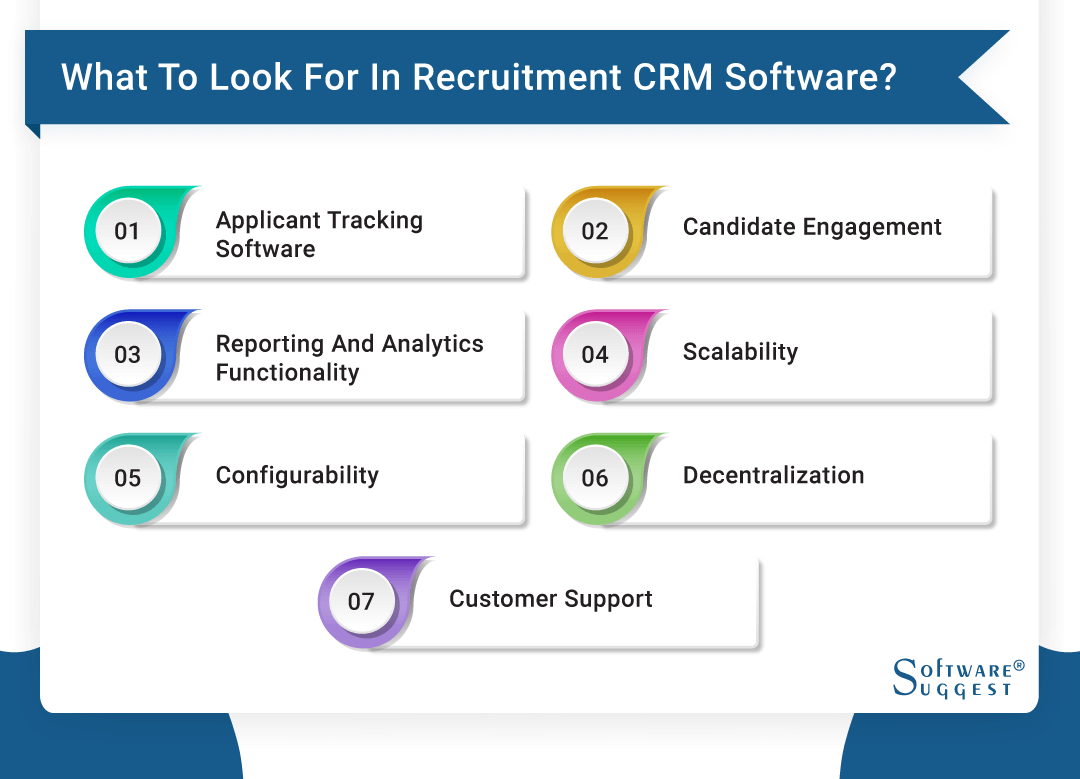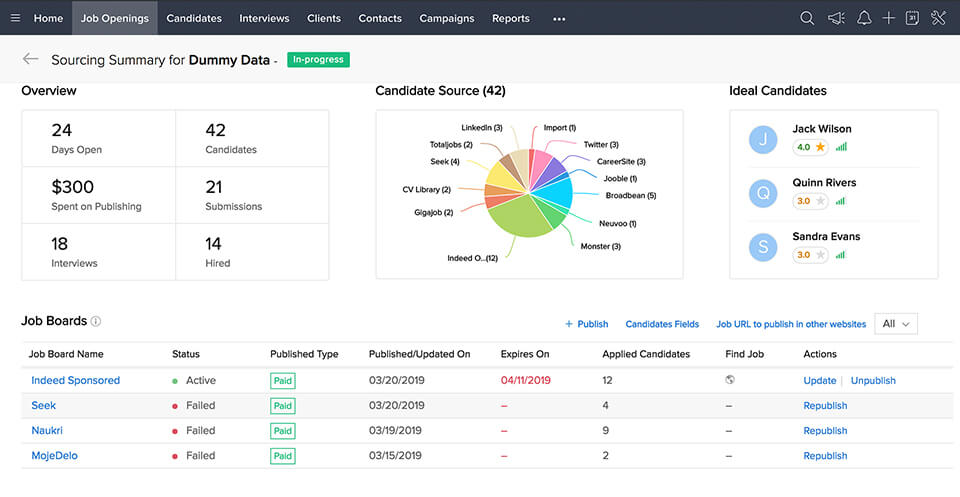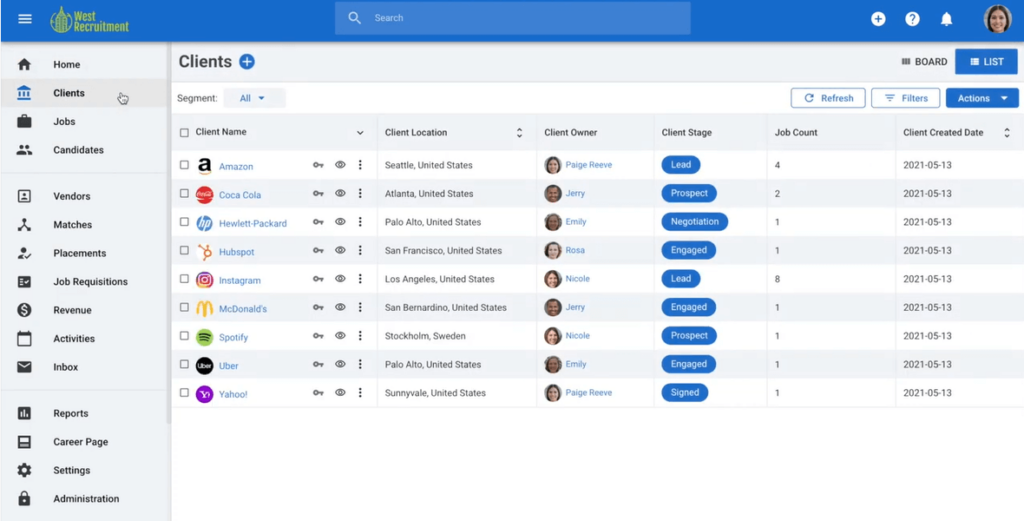Recruitment CRM systems are indispensable tools that revolutionize the hiring process for businesses. They streamline candidate management, improve collaboration, and provide valuable insights through reporting and analytics. In this comprehensive guide, we delve into the world of recruitment CRM systems, exploring their benefits, types, key features, and best practices to help you make informed decisions for your organization.
With a recruitment CRM system at the helm, you gain a competitive edge in attracting top talent and building a robust workforce. Dive in to discover how these systems can transform your hiring strategy.
Overview of Recruitment CRM Systems
Recruitment CRM (Customer Relationship Management) systems are specialized software solutions designed to streamline and enhance the recruitment process. They provide a centralized platform for managing candidate data, tracking job applications, and automating various tasks, enabling recruiters to efficiently source, screen, and hire top talent.Using a recruitment CRM system offers numerous benefits.
It helps recruiters save time and effort by automating repetitive tasks, such as scheduling interviews and sending out rejection letters. The centralized candidate database ensures that all candidate information is stored in one place, making it easily accessible to the entire recruiting team.
Additionally, recruitment CRM systems provide robust reporting and analytics capabilities, enabling recruiters to track key metrics and identify areas for improvement in their recruitment processes.Key features of a recruitment CRM system include:
- Candidate management: Store and organize candidate profiles, including contact information, skills, and experience.
- Job posting and sourcing: Post job openings on multiple platforms and manage candidate applications.
- Interview scheduling: Schedule and manage interviews with candidates, including reminders and follow-ups.
- Candidate evaluation: Track candidate progress through the hiring process, assess their performance, and make hiring decisions.
- Reporting and analytics: Generate reports on key metrics, such as time-to-fill, cost-per-hire, and candidate quality.
Types of Recruitment CRM Systems

Recruitment CRM systems can be classified into various types based on their deployment, target audience, and industry focus. Understanding the different types available will help you choose the system that best suits your organization’s needs.
Cloud-based vs. On-premise Recruitment CRM Systems
Cloud-based recruitment CRM systems are hosted by a third-party vendor and accessed via the internet. They offer flexibility, scalability, and reduced IT maintenance costs. On-premise recruitment CRM systems, on the other hand, are installed on your own servers and provide greater control over data security and customization.
Enterprise vs. Small Business Recruitment CRM Systems
Enterprise recruitment CRM systems are designed for large organizations with complex hiring processes and a high volume of candidates. They offer advanced features such as applicant tracking, candidate relationship management, and integration with other HR systems. Small business recruitment CRM systems are tailored to the needs of small businesses with a limited number of hires and a simpler hiring process.
Industry-specific Recruitment CRM Systems
Industry-specific recruitment CRM systems are designed to meet the unique needs of specific industries, such as healthcare, technology, or manufacturing. They offer pre-configured settings, industry-specific templates, and integrations with industry-specific tools and databases.
Benefits of Using a Recruitment CRM System
Recruitment CRM systems offer a range of benefits that can streamline the hiring process and improve the overall efficiency of your recruitment efforts. These benefits include:
Improved Candidate Management
- Centralized database for candidate information, including resumes, applications, and interview notes.
- Automated candidate tracking and status updates.
- Improved candidate communication and engagement.
Streamlined Hiring Process
- Automated job posting and applicant tracking.
- Simplified interview scheduling and coordination.
- Streamlined onboarding process.
Increased Collaboration
- Real-time collaboration between recruiters, hiring managers, and other stakeholders.
- Shared access to candidate information and notes.
- Improved coordination and decision-making.
Better Reporting and Analytics
- Detailed reporting on candidate metrics, such as time-to-fill, candidate source, and interview outcomes.
- Data-driven insights to improve recruitment strategies and identify areas for improvement.
- Customized dashboards for real-time visibility into recruitment performance.
Features of a Recruitment CRM System

Recruitment CRM systems offer a comprehensive suite of features designed to streamline and enhance the recruitment process. These features enable recruiters to manage candidates, track their progress, and automate various tasks, improving efficiency and effectiveness.
Key features of a recruitment CRM system include:
Candidate Database
A central repository for storing and managing candidate information, including contact details, skills, experience, and availability. It allows recruiters to easily search, filter, and access candidate profiles.
Job Posting Management
A tool for creating, publishing, and managing job postings across multiple channels. It enables recruiters to customize job descriptions, set hiring criteria, and track the performance of job postings.
Resume Parsing
An automated feature that extracts relevant information from candidate resumes, such as skills, experience, and education. It helps recruiters quickly identify qualified candidates and reduce manual data entry.
Candidate Tracking
A system for tracking the progress of candidates throughout the recruitment process. It allows recruiters to monitor the status of each candidate, schedule interviews, and communicate with them.
Interview Scheduling
A tool for scheduling and managing interviews with candidates. It enables recruiters to send interview invitations, set up interview times, and track the progress of interviews.
How to Choose the Right Recruitment CRM System

Selecting the optimal Recruitment CRM system for your organization requires careful consideration. This guide provides insights into evaluating and choosing the right system to streamline your recruitment process.
Consider your organization’s needs
Assess your organization’s unique requirements, including the number of recruiters, hiring volume, and specific industry or job function needs. Determine the core functionalities and features that align with your recruitment workflow.
Evaluate the features of different systems
Compare various CRM systems based on their key features. Consider their capabilities in candidate management, sourcing, applicant tracking, scheduling, and reporting. Evaluate their ease of use, customization options, and integration with other HR systems.
Get demos and references
Request demonstrations from potential vendors to gain hands-on experience with the system’s functionality. Seek references from existing customers to gather insights into their experiences and the system’s effectiveness.
Make a decision
After evaluating the features, demos, and references, make an informed decision based on your organization’s needs and budget. Consider the long-term benefits and potential return on investment before finalizing your choice.
Implementation and Best Practices: Recruitment Crm System

A successful implementation of a recruitment CRM system requires careful planning and execution. Here are some best practices to follow:
Begin by creating a comprehensive implementation plan that Artikels the project’s scope, timeline, and resources. This plan should be shared with all stakeholders to ensure everyone is on the same page.
Training Your Team
Once the system is implemented, it is essential to train your team on how to use it effectively. This training should cover all aspects of the system, from basic navigation to advanced features.
Setting Up Workflows and Automation
To streamline your recruitment process, take advantage of the system’s workflow and automation features. These features can help you automate tasks such as sending out candidate emails, scheduling interviews, and tracking applicant progress.
Monitoring Your Results and Making Adjustments
Once the system is up and running, it is important to monitor your results and make adjustments as needed. This will help you ensure that the system is meeting your needs and delivering the desired outcomes.
Last Recap
In conclusion, recruitment CRM systems are essential investments for businesses seeking to optimize their hiring processes. They provide a centralized platform for managing candidates, automating tasks, and gaining valuable insights. By carefully evaluating your organization’s needs, selecting the right system, and implementing best practices, you can unlock the full potential of recruitment CRM systems and elevate your talent acquisition strategy.